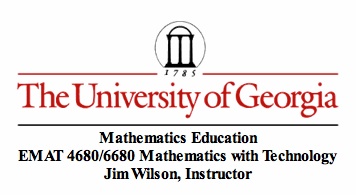

Last update October 15, 2014
ON LINE COURSE EVALUATION (to be activated at the end of the semester)
CLASS MEMBERS
Sarah E. Erwin Kirsten S. Keels Brooke C. Koblitz Kristina Patel Julia E. Przybyla-Kuchek Benjamin C. Roper Dongjo ShinClick HERE to send an e-mail to all of the class and to the instructor. Use the e-mails above for sending individual messages.
Some Entertainment (or is it?)
Romance of the Dot and the Line - Film
Donald in Mathmagic Land - Film
Teachers are People -- a 1952 Disney short film
Flatland -- A Romance of Many Dimensions -- a book in html
Teacher's Resignation Letter . . . My Profession no Longer Exists
SHORTCUT NAVIGATIONS ON THE WEB SITE
Annotated Bibliography -- Class project 2014
August 27 entries
September 3 entries
September 10 entries
September 17 entries
September 24 entries
October 1 entries
October 8 entries
October 22 entries
October 29 entries (Fall break is on Friday October 31, not Wednesday October 29)
November 5 entries
November 12 entries
November 19 entriesAnnotated Bibliography Combined in Alphabetical Order, 2014
This class will meet on Wednesday afternoons from 4:40 to 7:40. Note that the first class meets on August 20 and the last class meeting is December , that is, only one class after the Thanksgiving break. Our assigned Final Examination time is 6:30 - 9:30 on Wednesday, December 17.
University policy requires that the syllabus is to be posted to the University web site for each time a course is taught. There is tremendous variability in what is included in a syllabus. Further, the technology is out of date and web links included in our syllabus will not be active in the copy posted to the University. Not all syllabi from previous offerings of EMAT 7050 have been posted.
COURSE DESCRIPTION
The EMAT 7050 course is designed to investigate scholarly and practical issues that impact on the teaching of mathematics in grades 6 - 12. It will be a rather significant foray into the scholarly literature in mathematics education with a particular examination of research and policy issues.
The course will not be a methods course and appropriate degree programs from mathematics education for students in this course include Master of Education, Master of Arts, Specialist in Education, and Doctor of Philosophy.
Students in the Master of Arts in Teaching program for secondary mathematics should consider EMAT 6360 Teaching of Secondary Mathematics instead of EMAT 7050.
Students in the Master of Education program for middle school have taken this course in the past. Mathematics background is assumed.
Doctoral students in the mathematics Ph.D. program who are seeking the Certificate Program for Mathematics Education should consult an advisor for selecting the most appropriate course.
Historical overview of Mathematics Education (Waggener)
Common Core State Standards in Mathematics (CCSSM)
CCSSM Standards of Mathematical Practice
Learning to Think Mathematically (Schoenfeld)
Let Us Teach Guessing (Polya) (Slow-loading video. 60 minutes)
The Learning of Mathematics: Its Theory and Practice (NCTM 21st Yearbook, 1953)
References
I suppose all of these "references" could have been combined with the above section on "Materials." Class discussion will help to focus on the relevance of different pieces of this literature base. The course agenda will challenge us to expand the literature base as well as sift out items of limited relevance.
The "references" and "materials" will be expanded by the course productions, described below, that each student will produce.
Annotated Bibliography -- Class project, 2014. (Week by week link)
Each class member will submit at least one annotated bibliography item each class meeting. An item should
-- cite an article relevant to discussions of "mathematics instruction." If you read an article and feel it is not contributing, do not write it up; find another article. See the References for sample format of citations.
-- provide a full bibliographic citations (e.g., author(s), date of publication, title, and source). If the article is available on the web, so indicate.
-- the annotation should be no more that 150 words. It should, of course, convey something about the substance of the article and be thorough enough to allow others to decide if we want to examine the original.
-- if two people prepare a write-up of the same article, I expect you to get together and prepare a single, consensus annotation.
-- if you are motivated to read an article for which someone else has prepared a write-up and you disagree with their annotation or feel it can be improved with your input, meet with them and deal with it.
Items can be sent to me Tuesday evening before class on Wednesday and I will post them to the Annotated Bibliography link. I will post them as PDF files, but you can submit as either MicroSoft Word or PDF.
Annotated Bibliography -- Class project, 2013. (Week by week link)
CLASS ESSAYS (Papers in Progress)
Two essays will be required from each of the class members to be posted on the web site. The first is due on October 15. The second is due on December 3.
You will be expected to read and critique each other's October 15 essays.
EXAMINATIONS
Mid-term examination. Essay question. Take home. You will be given the examination on October 15 and it is due on October 22.
Final examination. Essay question. Take home. You will be given the examination on December 3 and it will be due on December 17.
Examination responses and feedback will NOT be posted to the web page.
DisclaimerThe content and opinions expressed on this Web page do not necessarily reflect the views or nor are they endorsed by the University of Georgia or the University System of Georgia.